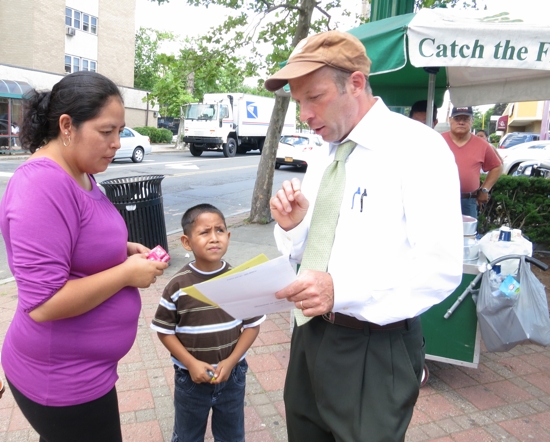
Paul Bass Photo
Kleppner, at right, talks up voting in Fair Haven.

The Greens have nominated a “democracy” professional to launch a campaign that will produce two winners. Or three.
The candidate, Caleb Kleppner, is running for city registrar of voters. He won the Green nomination (against no opponents) at a party convention Monday night.
Right now New Haven has two registrars. One Democrat and Republican.
State law (Section 9 – 190 of the General Statutes) requires that every city and town have at least two registrars: In most cases, one Democrat and one Republican.
If Kleppner comes in third place in the November election, New Haven will still have two registrars. One Democrat and one Republican.
If Kleppner comes in first or second place in the November election, New Haven will have three registrars: One Democrat, one Republican, and one Green.
That’s because the state statute guarantees that the two major parties get to have a full-time paid registrar, whether or not minor-party candidates beat them. So if Kleppner wins, a third $60,000-a-year position would be created. As in Hartford, where a second-place finish four years ago by a Working Families Party candidate has left that city’s registrar’s office with three top officials. (Secretary of the State Denise Merrill has heard from some voting-rights advocates pushing for nonpartisan local election officials, though any proposed change is not currently on the agenda, according to spokesman Av Harris.)
Kleppner’s not taking shots at his opponents on the New Haven campaign trail. He’s talking about democracy, about why registrar is a position worth competing for.
“I know that we can do more in New Haven in terms of engaging people in the electoral process and making it easier for people to get involved,” Kleppner, who’s 44, said in an interview. ““We can do more to reach out to people and make information more available, particularly through the web site.”
You might call Kleppner a democracy geek. It’s what he does, for money and for pleasure. He is one of four co-owners of a company called TrueBallot; it runs elections for unions and private associations. He volunteers for a local voter-registration and election-awareness group called New Haven Votes. (It was in that capacity that he was approaching potential voters at Grand Avenue and Ferry Street in Fair Haven Tuesday, as pictured at the top of this story.) He also served as chair of the board of New Haven’s Democracy Fund, which oversees New Haven’s public-financing system for mayoral elections.
As a voting registrar, Kleppner said, he would try to enlist more voters.
“The starting point is New Haven public schools,” he said. “We have a lot of high schools in this city. We the registrars should be going into the classrooms of high schools juniors and seniors and start a conversation about what it means to be an engaged citizen.”
New Haven has 62,273 registered voters, according to statistics released Monday by the Registrar of Voters. Democrats number 43,966; Republicans, 2,374; unaffiliated voters, 15,600; “other” (such as Greens), 333.
In addition to registering people, the registrars oversee an office that updates voter lists and monitors elections. They hire dozens of people at day rates to work long hours running the polls and then counting ballots. Click here and here to read about that.

The office has had remarkable continuity. Democratic Registrar Sharon Ferrucci (at left in photo) first won her office in 1988. Republican Rae Tramantano (at right) first won hers the same year. Ferrucci started working in the office as a staffer in 1979, Tramantano in 1980.
They work as a fond, loyal team, the personification of a bygone American political concept known as “bipartisan cooperation in the interest of good government.” They haven’t received raises for at least a decade, they said. They work long hours. But who’s complaining?
The registrars welcomed their sort-of opponent Kleppner to the race. They reserved comment on the race beyond noting that were he to win, he’d be joining them in a consuming task: helping New Haven adjust to the once-a-decade ward redistricting just completed by city aldermen. Confusion will reign at the polls for years; it will be up to the registrars to help voters navigate it.
Because of the bizarre shapes in which the ward map got redrawn, more voters than ever before will vote in one part of town in even-numbered years, another part of town in odd-numbered years. A full 56 different voting-precinct configurations now exist when you add together each voter’s city ward and state Assembly and Senate districts. People who live in Ward 21, for instance, will now vote in four different state legislative races.
Meanwhile, at just the city level, portions of three wards were extendedinto the two main existing East Rock wards, one of which now travels deep into Fair Haven. Fair Haveners who previously could walk to polling stations in their own neighborhood will now have to travel to Wilbur Cross High School to vote; East Rockers living near Wilbur Cross will travel to Newhallville or Dixwell.
Democracy: Nobody ever said it wasn’t messy.